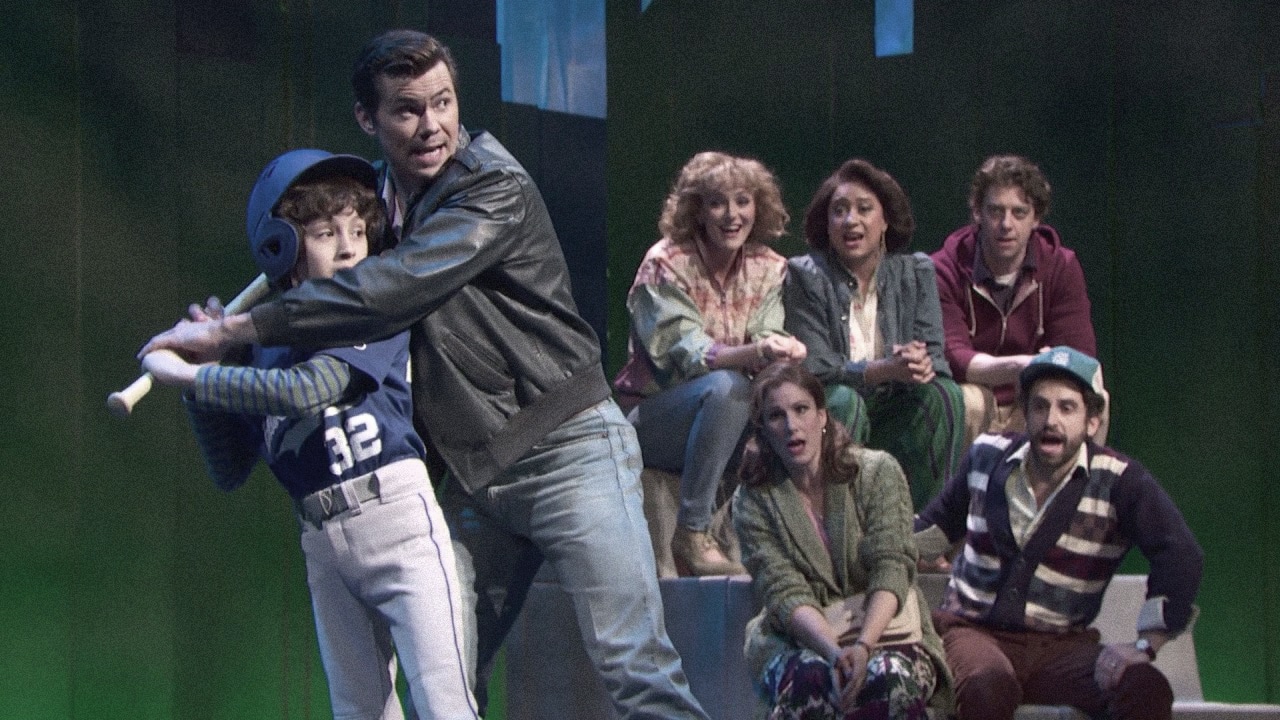[dropcap size=big]I[/dropcap] first saw Christian Borle, Broadway star, in the two-season FOX show Smash during my first couple of years of college, and I was fascinated with the world of musicals, falling in love in particular with Borle’s rendition of Billy Joel’s “Vienna.”
Years later, as I walked past the Portland (Maine) Nickelodeon, I caught his face on a poster for a 2016 revival of Falsettos and you can bet that I was in theatre for its special showing of the musical.
The two shows were then combined into one for the 1992 original Broadway run of Falsettos, which won 2 Tony Awards, and in its 2016 revival garnered 4 Tony nominations in its own right.
Falsettos was initially two one-act shows called March of the Falsettos and Falsettoland, the music and lyrics of each done by William Finn. The former of these two tells the story of Marvin, a gay man freshly out of the closet and still trying to decipher the dynamic between his now ex-wife, his adolescent son, and his lover, a man named Whizzer. Falsettoland introduces two women, Cordelia and Charlotte, who are lesbians, and it touches on deeper themes of the AIDS crisis in the early 1980s. The two shows were then combined into one for the 1992 original Broadway run of Falsettos, which won 2 Tony Awards, and in its 2016 revival garnered 4 Tony nominations in its own right. Trying to recapture that magic once again, it’s been recently announced that Falsettos would tour nationally in the 2019 season.
Is the show just about men singing in a high key?
Let’s start with March of the Falsettos. When the show premiered on its own in 1981, it was bringing attention to a story that hadn’t been spoken of widely yet. The plot takes place in 1979, just ten years after the Stonewall Riots, and same-sex marriage in the United States is a distant topic. The format of the show, in which only Marvin, his ex-wife Trina, his son Jason, his lover Whizzer, and his psychiatrist Mendel appear, forces the audience to focus on that topic. Not the usual story, during a time when many individuals repressed their true selves, entering into heterosexual relationships to keep with the status quo.
The thing is that this isn’t a story about being gay — it simply brings LGBTQ+ issues more into the light. At it’s core it’s still just a story about family.
Falsettoland continues this trend, adding Cordelia and Charlotte into the plot. Representationally, it’s great to see a couple of ladies who like ladies in there. Plus, plot wise, Charlotte is a doctor, and it’s she who concludes “something bad is happening” in medicine, just as Whizzer collapses playing racquetball with Marvin. Later being diagnosed with what will, a year later, be called AIDS.
The thing is that this isn’t a story about being gay — it simply brings LGBTQ+ issues more into the light. At it’s core it’s still just a story about family.
People weren’t entirely sure about what was happening, and once they knew, the government was very careful to never endorse homosexual behavior. The fear of AIDS was a very easy way to do this. AIDS wasn’t talked about, and many felt that they weren’t being assisted because of the taboo of having the disease.
Falsettos doesn’t call it by name because the show is not one about the AIDS crisis, but it shows the hurt it brings to a family, and it shows a love that is honest and true, and not unlike that of heterosexual couples in the world.
So what’s the big deal?
For this show to come out in 1992, in the middle of the America Responds to AIDS campaign put on by the Center for Disease Control, it was doing something brave. It was telling a story that needed to be told. Finn and Lapine’s work showed Marvin and Whizzer’s relationship as just as beautiful as any other. It showed acceptance, while many others in the same situation would be looked down upon because of their sexuality.
The fact that this story will continue to be told onstage through a national tour in 2019 is incredible. LGBTQ+ rights, issues, and history are still emphasized enough, and few know of the fear that permeated the community during this crisis in its past. Tens of thousands, if not more, have died from AIDS and many others are still shunned because of their sexuality.
…the AIDS crisis is not a widely discussed part of our history, and Falsettos opens the door to a larger discussion of the fear of loss that accompanies it.
Now, aside from Fun Home, Avenue Q, RENT, Hedwig and the Angry Inch and Falsettos, there are not many widely popular Broadway productions that highlight LGBTQ+ issues. Furthermore, the AIDS crisis is not a widely discussed part of our history, and Falsettos opens the door to a larger discussion of the fear of loss that accompanies it. These are stories that are critical to tell in order to better advocate for sexual health practices not only in the LGBTQ+ community but for everyone.
So, to put it simply (and in the words with which Endel concludes the show with), “[t]his is where we take a stand. Welcome to Falsettoland.”




